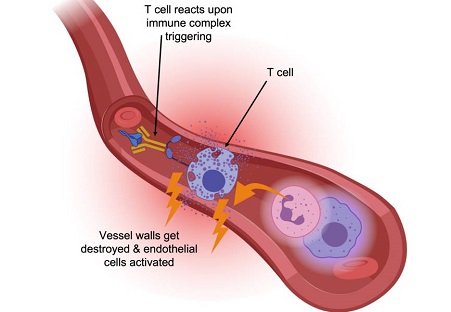Research News: Scientist Uncover ‘Deprogrammed' Regulatory CD16+CD56+ Cytotoxic CD4+ T Cells And Their Role In Cardiovascular Disease!
Thailand Medical News Team Aug 22, 2023 1 year, 7 months, 1 week, 1 day, 9 hours, 18 minutes ago
Research News: Within the intricate tapestry of the immune system, new revelations continue to challenge our understanding of health and disease. One such revelation centers around an extraordinary subset of immune cells: CD16+CD56+ cytotoxic CD4+ T cells.

Once considered rare and overshadowed by other T cell types, these cells have now taken the spotlight due to their intriguing role in cardiovascular health and disease. A new study delves into the realm of these unique T cells, exploring their attributes, functions, and potential implications for advancing our comprehension of cardiovascular conditions.
Discovery of a Hidden Army
Traditionally, the immune system has sorted T cells into distinct categories based on their specialized functions. Regulatory T cells (Tregs) have been acknowledged for their role in curbing excessive inflammation, akin to referees maintaining equilibrium on the immune battleground. On the contrary, T cells wielding cytotoxic capabilities have predominantly been associated with eliminating infected host cells. The convergence of these contrasting roles within a single subset - CD16+CD56+ cytotoxic CD4+ T cells - has sparked fervor among researchers.
Unmasking the Cytotoxic CD4+ T Cells
This new groundbreaking research spearheaded by researchers from La Jolla Institute for Immunology (LJI)-USA and the Medical College of Georgia (MCG) at Augusta University-USA has at last unveiled the mystique surrounding CD16+CD56+ cytotoxic CD4+ T cells.
These cells, previously elusive due to their scarcity and similarities with other T cell subtypes, have emerged as pivotal players in cardiovascular health and disease. They've been intricately linked to chronic inflammatory conditions, notably atherosclerosis - the insidious buildup of cholesterol-laden plaques within arterial walls.
Decoding the Role in Cardiovascular Health
The presence of CD16+CD56+ cytotoxic CD4+ T cells in atherosclerosis casts new illumination upon the complex immune responses underpinning cardiovascular ailments. Though initially recognized for their role in anti-viral responses, these cells appear to have morphed their function to contribute to the persistent inflammation characteristic of atherosclerosis. By targeting molecules such as apolipoprotein B (APOB) - a cornerstone of 'bad' cholesterol aggregation- these cells actively intensify the inflammation within arterial walls, exacerbating the disease progression.
From Protectors to Aggressors
The metamorphosis of Tregs into CD16+CD56+ cytotoxic CD4+ T cells - dubbed ex-T regulatory cells (exTregs) -unveils a remarkable twist in the immune narrative. These cells, having shed their regulatory attributes, now wield a pro-inflammatory persona. While the exact triggers for this cellular transformation remain under scrutiny, it's hypothesized to stem from the body's endeavor to adapt to chronic diseases. This transformation results in a subset of cells that once preserved immune balance now actively contribute to inflammation.
LJI Postdoctoral Researcher Dr Antoine Freuchet, Ph.D., who served as co-first author of the new study told
yle="font-size:16px">Research News reporters at TMN, "When you have too much chronic inflammation, say, for example, in heart disease, your body is highly stimulated and may be rewired to address the situation. Because of that, this kind of Tregs, whose purpose was to keep the bad guys in check, turn bad themselves. Instead of controlling the inflammatory guys, they acquire inflammatory properties."
Study senior author Dr Klaus Ley, M.D., co-director of MCG's Immunology Center of Georgia added, “T cells do many jobs in the body. Some T cells have the job of alerting other immune cells to danger or destroying infected host cells. These T cells are the fighters, the offensive lineup. T regulatory cells (Tregs) have the important job of stopping the other T cells from releasing too many inflammatory, or cytotoxic, molecules as they fight infection. The Tregs are like the referees.
In previous studies, the study team found that some T cells contribute to atherosclerosis by attacking a molecule called apolipoprotein B (APOB), the main component in the "bad" cholesterol that builds up into dangerous plaques in the arteries. These exTregs T cells ramp up their attacks as atherosclerosis worsens, likely adding to inflammation in the arteries. The strange thing is that these T cells look a lot like the normally helpful Tregs.”
Dr Payel Roy, Ph.D, LJI Postdoctoral Researcher and also co-first author of the study added, "These exTregs cells are likely causing damage. Now we have the potential to use these biomarkers and screen for these cells in human blood. Identifying exTregs in humans opens up more opportunities for research since patient material like blood samples are readily available.”
Implications for Future Research
The revelation of CD16+CD56+ cytotoxic CD4+ T cells ushers in a wealth of research opportunities. Identifying these cells within human subjects holds potential for diagnosing and monitoring chronic health conditions, including cardiovascular diseases. Furthermore, unraveling the molecular signatures of these cells could pave the way for targeted therapies aimed at attenuating their pro-inflammatory impact.
Conclusion
As our comprehension of immune system intricacies deepens, CD16+CD56+ cytotoxic CD4+ T cells have emerged as an unexpected yet vital component in the realm of cardiovascular health and disease. Their dual capacity to regulate and exacerbate inflammation within the cardiovascular context presents a unique vantage point for dissecting immune responses and designing potential therapeutic interventions. As researchers continue to peel back the layers of immune complexity, these cells stand as a testament to the ongoing revelation of the immune system's intricate mechanisms. Through their study, we gain not only insights into cardiovascular conditions but also a broader understanding of the symphony of immunity orchestrating our body's defense mechanisms.
The study findings were published in the peer reviewed journal: Nature Immunology.
https://www.nature.com/articles/s41590-023-01589-9
For the latest
Research News, keep on logging to Thailand Medical News.
